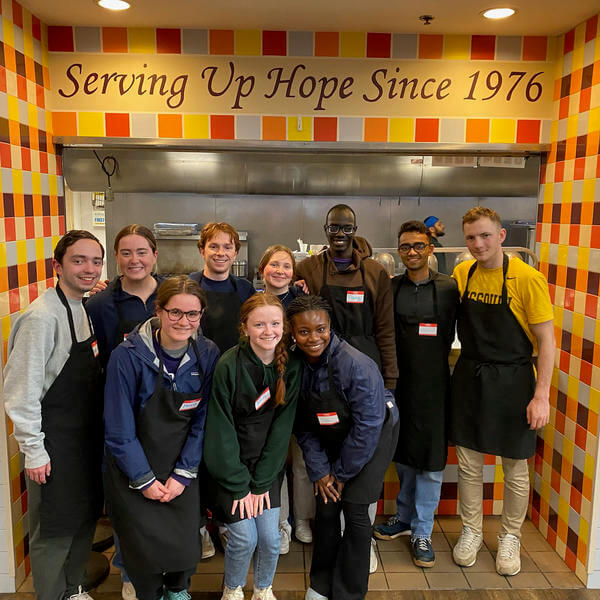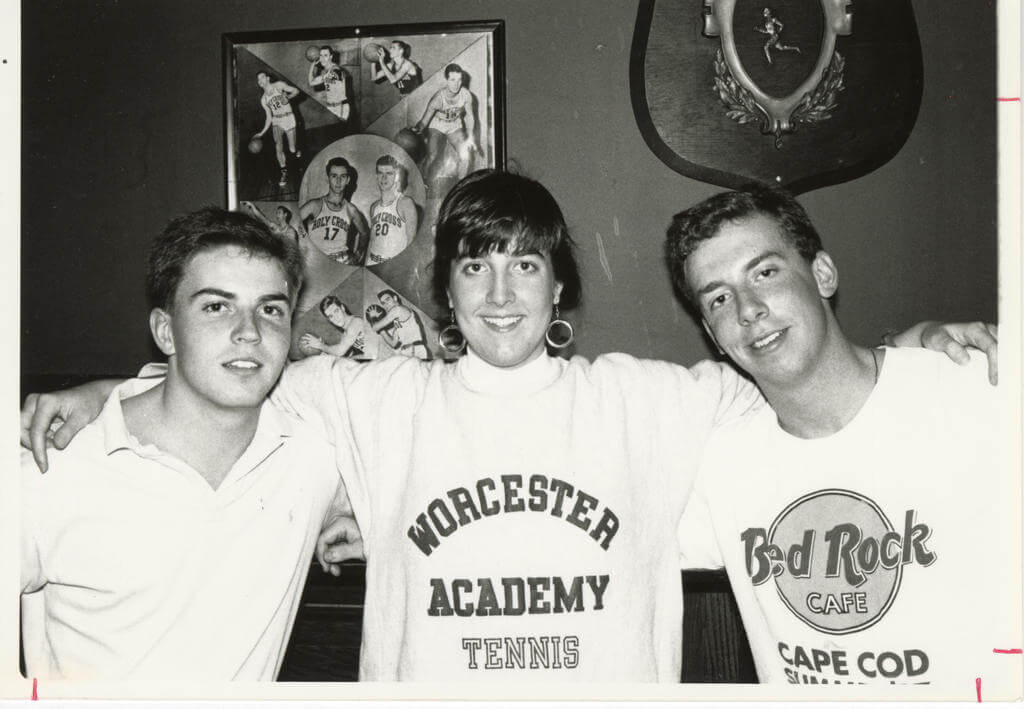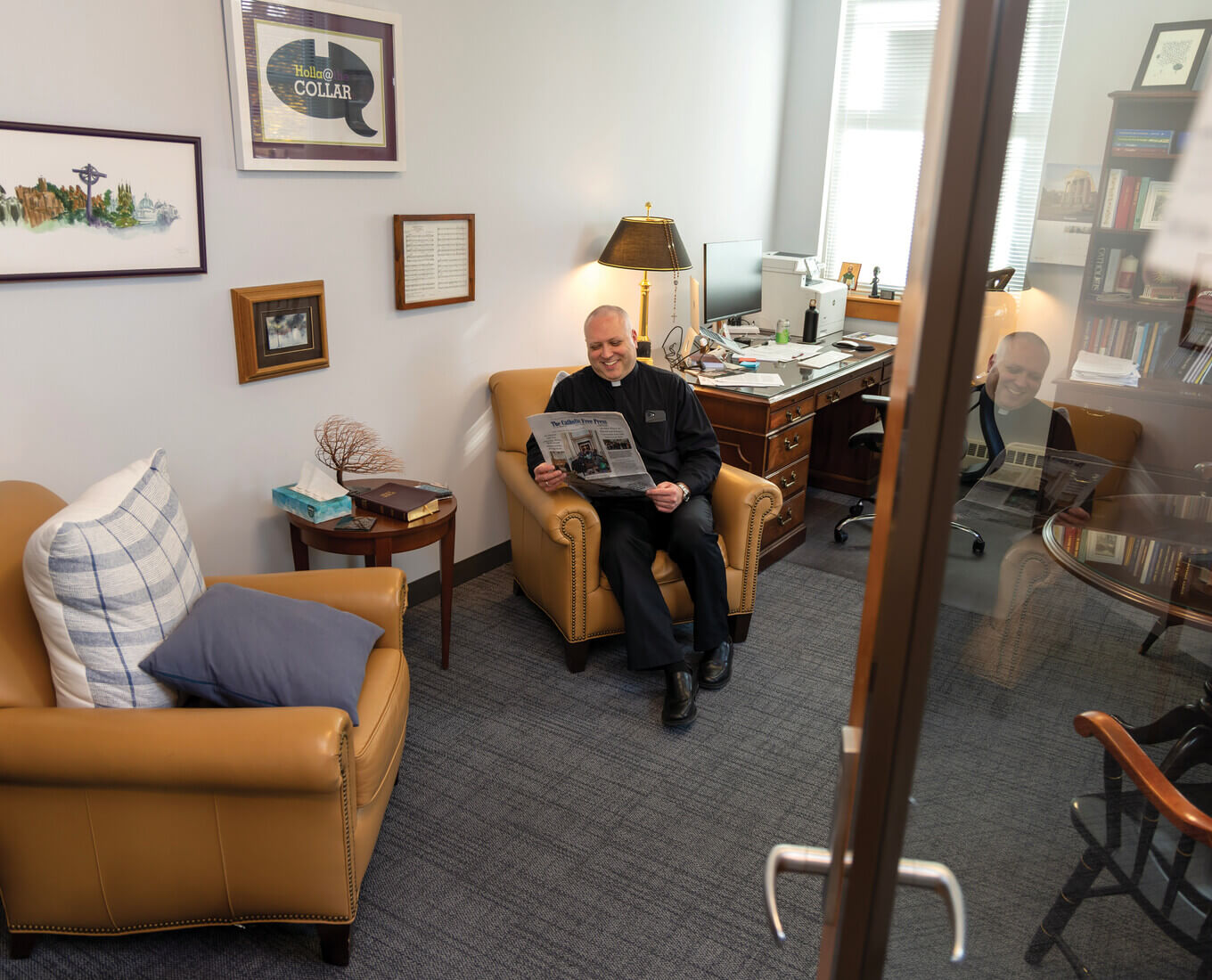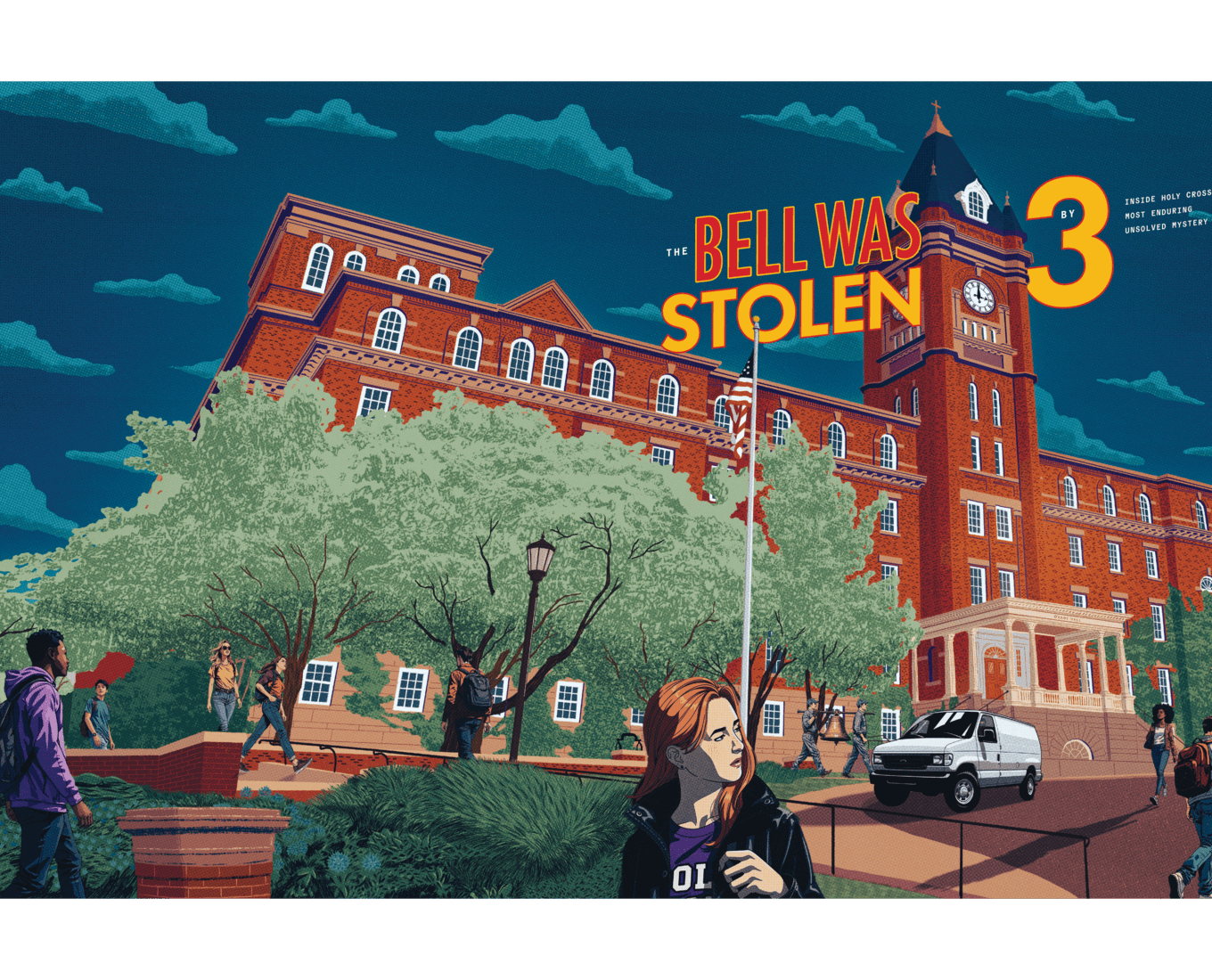It had been a long day. Deborah Adekunle ’25 was ready for dinner and sat down at a table in the dining room of The Center at Mariandale in Ossining, New York. She looked forward to the conversation with the Dominican sisters and other students who were there on a spring break immersion trip.
What she didn’t anticipate was the way a simple conversation with Sister Bette Ann would change her life.
After reflecting on the day, the nun shared her own story: The oldest of eight girls whose mother worked hard to afford a Catholic school education, she was well-traveled and maintained her curiosity of people and their communities. “She always took every opportunity to learn about the lives of the people she worked alongside,” Adekunle said.
It was that snippet from their conversation that resonated with Adekunle. The nun said that when she meets people, she keeps with her whatever lesson she learns from their encounter.
“A lot of the time when I do stuff, I just do it,” Adekunle said. “I leave after it’s finished and don’t really think about how that affected me, helped me, or maybe it didn’t help me. Sister Bette Anne really instilled that reflective spirit in me.”
How One Week in March Can Change a Life

For decades, Holy Cross’ spring break immersion program has provided life-altering opportunities for students to live with communities they wouldn’t otherwise encounter.
Read Time
She also encouraged Adekunle to ask herself: What are her passions? Not academic and career aspirations, but passions. “She asked me how I wanted to impact people. I wasn’t sure,” Adekunle said.
That evening, they and others went on a “midnight run” to Manhattan, where they shared food and clothing with the hungry and homeless. “We drove through the streets looking for people to give them coffee and sandwiches. When we were looking for a pair of jeans for a woman, three girls with Chanel bags walked by after just leaving the club. I’m not judging them. It was just a startling reminder that wealth and poverty live in the same place,” Adekunle notes.
It reminded her of when she was younger and would help her mother, who then owned a catering business, pick up leftover packed lunches she’d brought to offices that morning and deliver them to the homeless shelters in the evening.
“That really affected me,” she said. “I just thought whatever I can do to make one life better and shift that imbalance just a bit, from then on I’d try.”
Seeds planted in Appalachia
Originally known as the Appalachia, the Holy Cross spring break immersion program started in the 1970s with students traveling to the mountains of West Virginia, Virginia and Kentucky. It transformed into the current program in the early 2000s and now includes sites throughout the Eastern and Central U.S.
Each student group is led by a Holy Cross senior and is an opportunity to build relationships across economic, regional and cultural differences with others throughout the country. It involves direct service to a community, yet rather than going to solely “make a difference,” the program’s goal is for students to experience the “with” in the Jesuit spirit of being people for and with others.

For generations of Holy Cross alumni, spring break immersion memories are easy to recall. Laura Marcucio ’99 remembers piling into an 18-passenger van with fellow students, each who brought their own mixtape, and then sleeping on a YMCA gym floor with hundreds of others.
“The freedom we felt and the bonds we made … I can’t remember the exact site we went to in Damascus, Virginia, but I remember how it made me feel,” she said.
She called home toward the end of the week, not out of homesickness but to ask for a family recipe. “Throughout the week, we were in people’s homes and shared their hospitality in beautiful ways,” she said. “Before we left, we had a night when we invited them to share in ours. It was the first time I learned to cook my mom’s chicken parm. It was an important rite of passage for me, and I wanted to share it with them.”
Appalachia was part of Marcucio’s journey in her search to do more. She wanted to work with community pillars, members intrinsically connected to the area and the people, to learn their stories. She learned why raking leaves and picking up glass bottles from a man’s front yard might seem like a logical way to clear litter, but could cause great stress to the homeowner.
“I’m ever more careful in my encounters with people. I let them speak their story and listen. I don’t offer to help unless asked and then ask how,” she said.
I can’t remember the exact site we went to in Damascus, Virginia, but I remember how it made me feel.
As an Appalachia leader her senior year, Marcucio developed a close relationship with the Rev. Jim Hayes, S.J., ’72, associate chaplain for mission, who guided her through the trip preparation. He was also a mentor who shared with her an important discernment tool when she had to make a decision about her future on an extremely short timeline. She chose to carry her Appalachia experience forward and joined the Jesuit Volunteer Corps (JVC) upon graduation, spending more than two years in Peru. There she learned more about service and extending the commitment to longer term connections to people. She showed students how to work with families with dignity, equity and respect as they repair and rebuild homes.
“There were lots of seeds planted in Appalachia,” she said. “The thirst for greater service and [the Jesuit] Magis are a huge part of me today.”
“Wow” moments
For Jack Chaffee ’20 and Elisabeth Villa ’22 seeds were planted for their future at L’Arche, an international organization that advocates for the rights and inclusion of people with intellectual and developmental disabilities.
Working with intellectually and physically disabled adults made sense to Chaffee, as he worked with the community in a variety of programs on and off campus. During his first year on The Hill, he went to one of the spring break immersion Appalachia sites, but he couldn’t get L’Arche out of his mind. For his sophomore year, he traveled to the Jacksonville, Florida, L’Arche site and then to Haverhill, Massachusetts, the following.
“I’ve worked with people with various disabilities through school, but never thought about what happens once they’re no longer part of the educational system. My time with L’Arche gave me my ‘wow’ moments. It showed me what opportunities there are and what life can be like,” he said.
There are some core lessons from L’Arche that I will never forget.
When he started considering what to do after college, Chaffee thought about joining JVC. Then, he noticed that he kept looking for JVC L’Arche sites.
“I kept getting drawn back to it. I had time and really wanted to experience what I could not get from one week and something I knew I couldn’t learn anywhere else,” he said. Chaffee returned to the Florida location and for two years worked as a full-time live-in assistant and a house coordinator. Today, Chaffee is carrying his L’Arche lessons to law school; his personal focus is on human dignity and protecting how people treat and engage with others.
“There are some core lessons from L’Arche that I will never forget. One is to treat each other more human,” Chaffee said. “L’Arche reaffirmed my interest in this type of work and career path.”
The work also reaffirmed Villa’s career path: to continue her work with L’Arche in Ireland.
“I have always wanted to do something with other people. L’Arche and the spring break immersion program itself opened my eyes to different ways to become involved with smaller nonprofit organizations,” Villa said.
During her first-year student at L’Arche Alabama, Villa spent quality time with people who live there — referred to as core members — and got to know them through interactions on small projects. In her senior year, she returned to a L’Arche site and focused on building authentic and genuine connections and bringing that mentality back to Holy Cross.
“Spring break immersion planted the seed for so much growth and opportunity,” Villa said. “I finally understood the power and magnitude of that one week.” As a live-in assistant for one of the five houses at L’Arche Cork in Ireland, Villa supports core members with basic tasks and helps them develop life skills, such as cooking, cleaning and organization, so they can increase their levels of independence.
Carrying pieces and stories forward
Now in her 20th year of teaching, Marcucio takes a group of her high school students to Nazareth Farm in West Virginia for a similar immersion program.
“Holding and honoring the sacredness of everyone’s story, and holding it gently, is what came from my Appalachia experience,” Marcucio said. “The desire to know more people and hold their stories with sacredness and reverence, I use this to teach students how to grow.”
“The heart of the spring break immersion trips are the stories of the people who you get to immerse yourself [with],” Adekunle adds.
Since March 2023, Adekunle has kept a piece of Sister Bette Ann with her. She has volunteered with Worcester Public Schools as part of the College’s Student Programs for Urban Development program. She collects food to donate to a friend’s effort to send groceries home with Worcester middle school students to have on weekends. The sister’s words rang in Adekunle’s ears when she visited Camden, New Jersey, in March 2024 for her spring break immersion trip.
“Try my best: I didn’t do that until after Ossining. I didn’t think I had time for it when, really, I just wasn’t making it a priority. Now, I get more involved. I want to be more involved in the Worcester community. Sister Bette Ann reminded me that I couldn’t travel to Ossining and have an impact on that community and then do nothing in Worcester,” she said.
Adekunle’s perspective shifted from focusing on enrolling in challenging courses and achieving a high GPA to enrolling in and doing well in classes that interest her and are required for a future career in the biotech industry, and living her college life in a way in which she is proud.
“What I tell myself before each experience is that I need to get comfortable in discomfort. You’ll feel discomfort and that’s OK,” Adekunle said. “Either way, you’ll find out more about yourself and take with you a piece of that experience, a part of that community, that you’ll hold forever.

